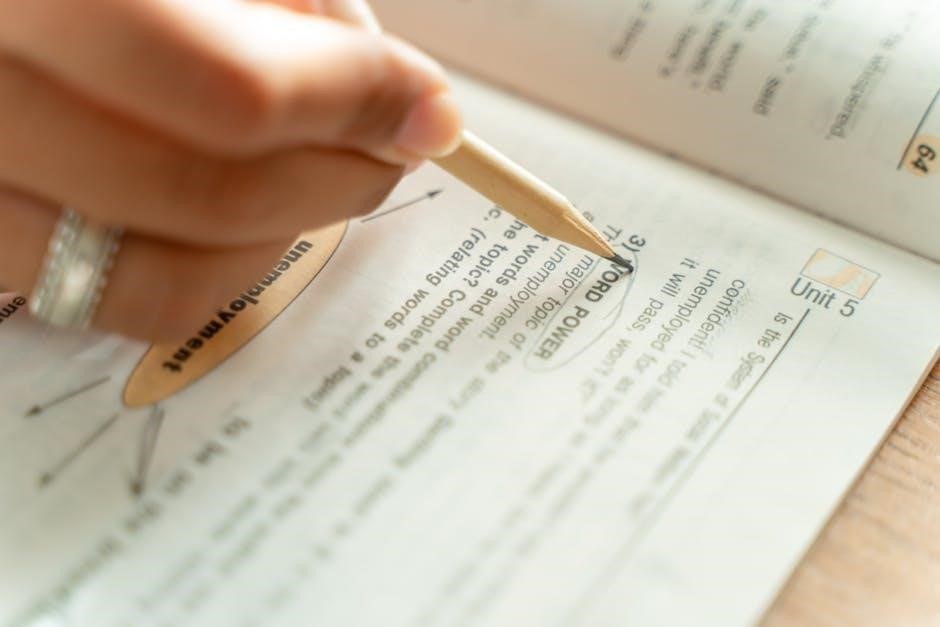The NYS Notary Exam is a critical step to becoming a Notary Public in New York, requiring thorough preparation and knowledge of state-specific laws and procedures.
1.1 Overview of the Exam Structure
The New York Notary Exam consists of 40 multiple-choice questions designed to test your knowledge of notary laws, procedures, and ethical practices in NYS. To pass, you must correctly answer at least 70% of the questions, or 28 out of 40. The exam is timed, allowing one hour to complete it. Questions cover topics such as notarization types, certificates, conflicts of interest, and maintaining a notary log. The exam format ensures a thorough understanding of state-specific regulations and your ability to apply them in real-world scenarios. Proper preparation is essential to navigate the exam confidently and successfully.
1.2 Importance of Preparation
Thorough preparation is crucial for success on the New York Notary Exam, as it ensures a strong understanding of state-specific laws and procedures. Without proper study, candidates risk failing, which can delay their ability to practice as a Notary Public. The exam covers complex topics like ethical considerations, notarization types, and legal responsibilities. Utilizing study guides, practice exams, and memorization techniques helps identify weak areas and builds confidence. Preparation not only improves test performance but also equips you with the knowledge needed to perform notarial duties accurately and ethically. Investing time in studying ensures long-term success in your notary career.

Key Topics to Study for the NYS Notary Exam
Focus on New York notary laws, procedures, and ethical responsibilities. Understand types of notarizations, certificates, and maintaining a notary log. Mastering these topics ensures exam success.
2.1 Notary Laws and Procedures in New York State

Understanding New York notary laws and procedures is essential. Key topics include the role of a notary, refusal criteria for notarization, and types of certificates. Notaries must verify identities, ensure willingness to sign, and avoid conflicts of interest. They must also maintain a notary log, as required by law. Familiarity with penalties for misconduct, such as fines or imprisonment, is crucial. Additionally, notaries should know how to handle special cases, like notarizing for individuals with disabilities. Mastering these legal and procedural details ensures compliance and ethical practice, which are heavily tested on the exam. Proper training and study are vital for success.
2.2 Types of Notarizations and Certificates
The New York Notary Exam tests knowledge of various notarization types and certificates. Common notarizations include acknowledgments, affidavits, and jurats. Acknowledgments confirm identity and voluntary signing, while jurats require the signer to swear or affirm the document’s truth. Certificates like the “Subscribing Witness” and “Proof of Execution” are also covered. Understanding the differences and proper usage of these certificates is crucial for ethical notary practice and exam success. Additionally, the exam may address special certificates for real estate conveyances and powers of attorney. Mastery of these elements ensures accurate document execution and compliance with state laws.

Effective Study Strategies
Mastering the NYS Notary Exam requires active learning techniques. Use practice exams to simulate test conditions, and employ flashcards for quick memorization of key terms and concepts.
3.1 Utilizing Practice Exams
Practice exams are an essential tool for preparing for the NYS Notary Exam. They provide a realistic simulation of the actual test, helping you become familiar with the format, question types, and time constraints. By taking practice exams, you can identify areas where you need improvement and focus your study efforts accordingly. Many free online resources offer sample questions that cover key topics, such as notary laws, procedures, and ethical considerations. Regularly reviewing practice exams will enhance your confidence and ensure you are well-prepared for the challenges of the official exam.
3.2 Flashcards and Memorization Techniques
Flashcards are a highly effective study tool for memorizing key terms and concepts for the NYS Notary Exam. Create flashcards for important definitions, notary laws, and procedures. Write the term on one side and the explanation or concept on the other. Reviewing flashcards regularly helps reinforce memory retention. Pair this with spaced repetition, where you revisit cards at increasing intervals, to ensure long-term retention. Additionally, use mnemonics or associations to remember complex procedures. Flashcards can be easily created using free online tools or apps, making them a convenient and portable study resource for mastering exam material efficiently.

Free Study Resources
Free online resources, including guides and practice questions from iPREP and Quizlet, provide comprehensive preparation for the NYS Notary Exam, covering exam formats and key topics effectively.
4.1 Recommended Online Study Guides

Several free online study guides are available to help prepare for the NYS Notary Exam. iPREP offers a comprehensive guide with practice questions and detailed explanations. Quizlet provides flashcards covering key terms and concepts. The New York State Notary Association also offers a free study guide updated in 2016. These resources are designed to familiarize candidates with exam formats and content, ensuring effective preparation. They cover essential topics like notary laws, procedures, and ethical considerations. Utilizing these guides can significantly improve readiness for the exam, helping candidates understand and master the material efficiently.
4.2 Free Practice Questions and Tests
Free practice questions and tests are invaluable for NYS Notary Exam preparation. iPREP offers a free practice exam with multiple-choice questions, hints, and detailed explanations to simulate the actual test experience. The New York State Notary Association provides sample questions updated in 2016, covering key topics like notarization types and legal responsibilities. Quizlet also features flashcards with relevant terms and scenarios. These resources help candidates identify weak areas, improve time management, and build confidence. Regularly practicing with these tools ensures familiarity with the exam format and content, maximizing chances of success on test day.

Ethical Considerations and Legal Responsibilities
Notaries must uphold ethical standards, avoiding conflicts of interest and ensuring impartiality. Maintaining a Notary Log is crucial for accountability and legal compliance, preventing fraudulent activities and protecting signers’ rights.
5.1 Avoiding Conflicts of Interest
Avoiding conflicts of interest is essential for Notaries to maintain impartiality. A Notary must not perform a notarization if personally involved or biased. This ensures fairness and prevents fraud. Refusing service when impartiality is compromised is crucial. Understanding legal boundaries is vital to ethical practice and compliance with NYS laws.
5.2 Maintaining a Notary Log
Maintaining a Notary log is a legal requirement in New York State. It ensures accountability and helps prevent fraud. Each entry should include the date, type of notarization, document description, and signer’s ID. The log must be accurate and retained for 6 years. Proper record-keeping demonstrates professionalism and compliance with ethical standards. Failure to maintain a log can result in penalties, making it a critical part of a Notary’s responsibilities.

Test Day Preparation
Arrive early with required documents. Manage time effectively, answering easier questions first. Ensure proper identification and maintain a calm, focused mindset throughout the exam.
6.1 Understanding the Exam Format
The NYS Notary Exam consists of 40 multiple-choice questions, each with four options. You have one hour to complete the test, and a passing score requires 70% accuracy. The exam assesses knowledge of New York notary laws, procedures, and ethical responsibilities. Questions cover topics like notarization types, certificates, and legal requirements. Familiarize yourself with the format to manage time effectively. Each question tests specific knowledge, and some may be worded to ensure understanding of nuances in notary practices. Reading questions carefully and eliminating incorrect answers can improve your chances of selecting the right response.
6.2 Time Management Tips
Effective time management is crucial for success on the NYS Notary Exam. Allocate 1.5 minutes per question to ensure thorough reading and thoughtful consideration. Avoid spending too much time on a single question—skip it and return later if needed. Skim through the exam first to identify easier questions and answer them promptly, building momentum and confidence. Use the remaining time to tackle more challenging questions. Remember, the goal is to attempt all 40 questions within the one-hour timeframe. Practice this strategy during your study sessions to enhance your exam-day performance and reduce stress.



0 Comments